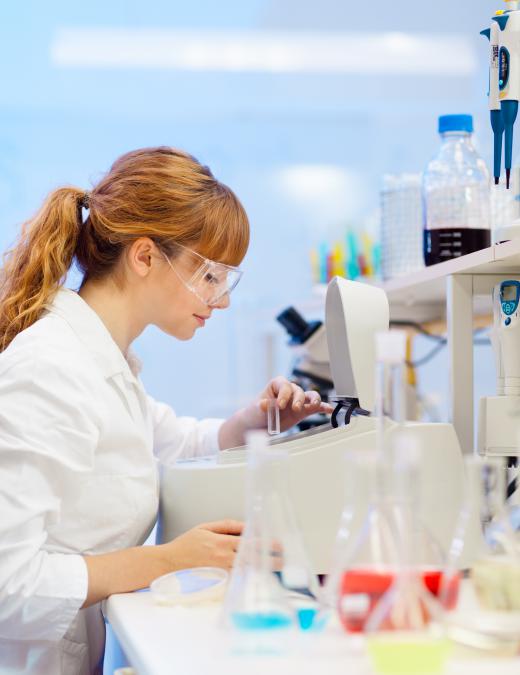What Is a Food Scientist?
A food scientist performs research and laboratory tests on different food products. He or she might try to determine the contents and nutritional value of certain foods, develop better preservatives, implement new packaging and food safety techniques, or discover new sources of food. These professionals are different from nutritionists or dietitians, whose job is to recommend the best diet depending on a person's health goals. They can also aid the development of natural food supplements that can support nutritional or dietary goals of certain people. Most professionals work in research and development laboratories at food processing facilities, though a food scientist might also find employment with a governmental organization. They can also work with private companies that manufacture food supplements and other health products.
Professionals employed by food processing plants create new products and perform quality control inspections on existing ones. For example, green powder foods have to be tested as more and more variants with different benefits are introduced. A food scientist in research and development analyzes the components of foods, such as their nutrients, vitamins, sugars, and fats. They're different from nutrition experts who are responsible for helping patients monitor how they eat as well as ensure that they are being mindful of the quality of the food they're consuming. He or she may experiment with healthier ingredients or new processing strategies to improve food quality. Food scientists also design new canning and packaging methods that promote the longevity of edible produts. Quality control specialists test products after they have been processed to ensure that they meet standards set by the food industry and the government.

In the United States, the Food and Drug Administration (FDA) employs food scientists to perform detailed inspections of food processing plants, ensuring the safety of their operations and products. A food scientist working for the FDA may enforce health codes and cite factories that to not meet standards. He or she may perform laboratory tests on products to determine the presence of any biological or chemical hazards. When foods do not pass inspections, the scientist often has the authority to stop production and offer solutions to bring products up to standards. He or she writes detailed reports and keeps careful records of a facility's operations and violations.

To become a food scientist, a person must usually hold at least a bachelor's degree in food technology, though scientists hoping to perform independent research often seek advanced degrees. Students commonly take general biology and chemistry courses in addition to food-specific classes in processing, engineering, and microbiology. A graduate who finds work with either a governmental or private organization may be offered paid, on-the-job training by experienced scientists. Additional certification and training in hazard analysis is often required for food scientists in government positions.

There is a steady demand for skilled food scientists to come up with new and better foods. And this isn't just for regular, everyday foods. It also includes powdered food supplements and other health products that are nutritionally beneficial. As people become more health conscious, they rely on food scientists to implement stricter nutritional guidelines and create great tasting, healthy treats. Advances in laboratory technology and equipment are creating more jobs for computer savvy and mechanically minded food scientists, who can use their skills to efficiently program and operate complex systems.
AS FEATURED ON:
AS FEATURED ON:
















Discussion Comments
I just wonder how food digests and supplies the body with adequate nutrients.
@honeysuckle- I have a nephew that went into this field. I can tell you that a food scientist's education takes about six years. My nephew got his Master's Degree and works for a food company in Georgia. If you want to teach food science, you might even have to get a Doctorate.
It sounds like you need to talk to your college counselor to find out what your options are. Good luck to you on your endeavors--my nephew loves his career!
I wonder how long a food scientist's education has to be?
I am in my second year of community college taking General courses.
Post your comments